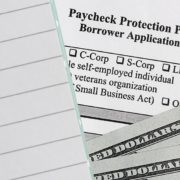2020 Payroll Tax Deferral — Is it the Right Choice for Your Business?
Contributed by: Laura O’Keefe, CPA – Supervisor
This year has brought with it many tax shifts, changes, and disruptions, making it critical for taxpayers to stay on top of recent regulatory adjustments. One of the latest tax modifications is the 2020 Payroll Tax Deferral. On August 8, 2020, President Trump issued an executive action that allowed employers to defer the withholding and payment of their employees’ portion of the social security tax for the period between September 1, 2020 and December 31, 2020. The amount deferred would be withheld from wages and deposited (by the employer) ratably in the period between January 1, 2021, and April 30, 2021.
Recognizing Key Components of the Tax Deferral Process
Like all tax legislation, the deferment comes with requirements. The first thing to know is that only employees with biweekly wages of $4,000 or less ($104,000 annual salary) are eligible. Other essential factors to consider for the tax deferral include:
Benefits to Employees
This would allow employees greater take-home pay during the deferment period. (6.2% of gross wages)
Employee Disadvantages
Their paychecks during the repayment period will be smaller by the same amount that was deferred, creating potential additional hardships if they did not budget properly for the repayment.
Benefits to Employers
None. The sole purpose of this deferment is to help employees with increasing overall take-home pay during this time period.
Employer Disadvantages
There are some disadvantages to employers that warrant consideration, including:
- Cost of implementation (reprogramming, administrative costs, etc.)
- Employers are responsible for repaying the tax, even if the employee leaves within the repayment period. They can try to make repayment arrangements with the employee, but ultimately, the employer is responsible for the tax
- There will be additional penalties and interest on any unpaid taxes after April 30, 2021
One thing that is important to note is that Trump has suggested the possibility of permanent forgiveness of the deferred amount, but there is little support from either party, and most feel forgiveness would be highly unlikely.
Contact Leone, McDonnell & Roberts today
Wondering if you should offer deferment to your employees? Our experienced tax professionals can help walk you through the process to determine what makes the most sense for your business. Contact us today to learn more.










